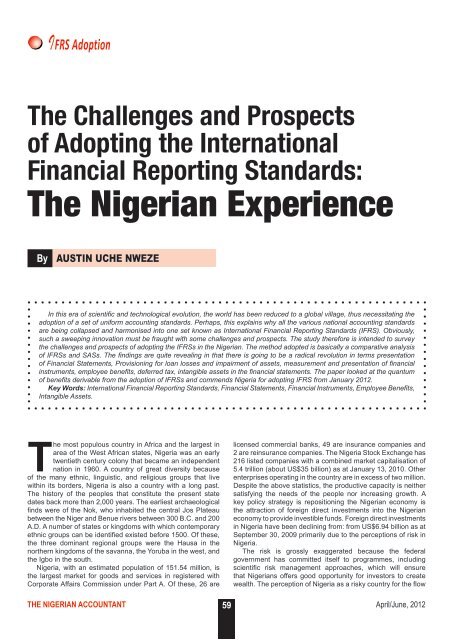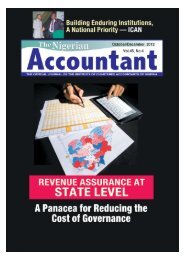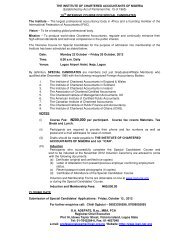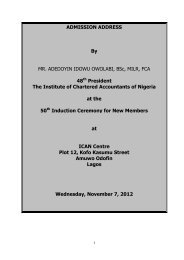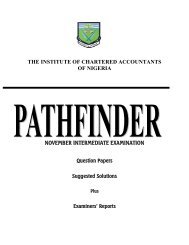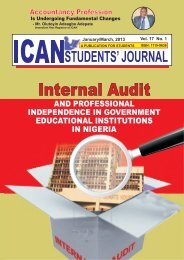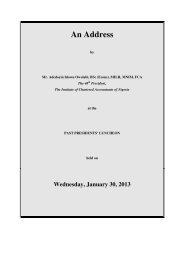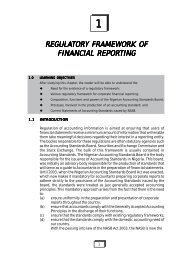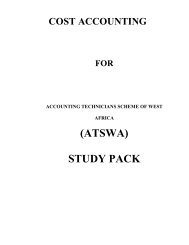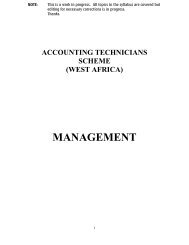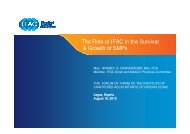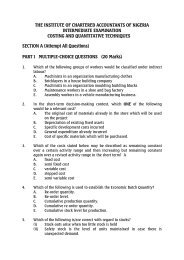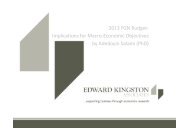The Nigerian Accountant 2012 - The Institute of Chartered ...
The Nigerian Accountant 2012 - The Institute of Chartered ...
The Nigerian Accountant 2012 - The Institute of Chartered ...
You also want an ePaper? Increase the reach of your titles
YUMPU automatically turns print PDFs into web optimized ePapers that Google loves.
IFRS Adoption<br />
<strong>The</strong> Challenges and Prospects<br />
<strong>of</strong> Adopting the International<br />
Financial Reporting Standards:<br />
<strong>The</strong> <strong>Nigerian</strong> Experience<br />
By AUSTIN UCHE NWEZE<br />
In this era <strong>of</strong> scientific and technological evolution, the world has been reduced to a global village, thus necessitating the<br />
adoption <strong>of</strong> a set <strong>of</strong> uniform accounting standards. Perhaps, this explains why all the various national accounting standards<br />
are being collapsed and harmonised into one set known as International Financial Reporting Standards (IFRS). Obviously,<br />
such a sweeping innovation must be fraught with some challenges and prospects. <strong>The</strong> study therefore is intended to survey<br />
the challenges and prospects <strong>of</strong> adopting the IFRSs in the <strong>Nigerian</strong>. <strong>The</strong> method adopted is basically a comparative analysis<br />
<strong>of</strong> IFRSs and SASs. <strong>The</strong> findings are quite revealing in that there is going to be a radical revolution in terms presentation<br />
<strong>of</strong> Financial Statements, Provisioning for loan losses and impairment <strong>of</strong> assets, measurement and presentation <strong>of</strong> financial<br />
instruments, employee benefits, deferred tax, intangible assets in the financial statements. <strong>The</strong> paper looked at the quantum<br />
<strong>of</strong> benefits derivable from the adoption <strong>of</strong> IFRSs and commends Nigeria for adopting IFRS from January <strong>2012</strong>.<br />
Key Words: International Financial Reporting Standards, Financial Statements, Financial Instruments, Employee Benefits,<br />
Intangible Assets.<br />
<strong>The</strong> most populous country in Africa and the largest in<br />
area <strong>of</strong> the West African states, Nigeria was an early<br />
twentieth century colony that became an independent<br />
nation in 1960. A country <strong>of</strong> great diversity because<br />
<strong>of</strong> the many ethnic, linguistic, and religious groups that live<br />
within its borders, Nigeria is also a country with a long past.<br />
<strong>The</strong> history <strong>of</strong> the peoples that constitute the present state<br />
dates back more than 2,000 years. <strong>The</strong> earliest archaeological<br />
finds were <strong>of</strong> the Nok, who inhabited the central Jos Plateau<br />
between the Niger and Benue rivers between 300 B.C. and 200<br />
A.D. A number <strong>of</strong> states or kingdoms with which contemporary<br />
ethnic groups can be identified existed before 1500. Of these,<br />
the three dominant regional groups were the Hausa in the<br />
northern kingdoms <strong>of</strong> the savanna, the Yoruba in the west, and<br />
the Igbo in the south.<br />
Nigeria, with an estimated population <strong>of</strong> 151.54 million, is<br />
the largest market for goods and services in registered with<br />
Corporate Affairs Commission under Part A. Of these, 26 are<br />
licensed commercial banks, 49 are insurance companies and<br />
2 are reinsurance companies. <strong>The</strong> Nigeria Stock Exchange has<br />
216 listed companies with a combined market capitalisation <strong>of</strong><br />
5.4 trillion (about US$35 billion) as at January 13, 2010. Other<br />
enterprises operating in the country are in excess <strong>of</strong> two million.<br />
Despite the above statistics, the productive capacity is neither<br />
satisfying the needs <strong>of</strong> the people nor increasing growth. A<br />
key policy strategy is repositioning the <strong>Nigerian</strong> economy is<br />
the attraction <strong>of</strong> foreign direct investments into the <strong>Nigerian</strong><br />
economy to provide investible funds. Foreign direct investments<br />
in Nigeria have been declining from: from US$6.94 billion as at<br />
September 30, 2009 primarily due to the perceptions <strong>of</strong> risk in<br />
Nigeria.<br />
<strong>The</strong> risk is grossly exaggerated because the federal<br />
government has committed itself to programmes, including<br />
scientific risk management approaches, which will ensure<br />
that <strong>Nigerian</strong>s <strong>of</strong>fers good opportunity for investors to create<br />
wealth. <strong>The</strong> perception <strong>of</strong> Nigeria as a risky country for the flow<br />
THE NIGERIAN ACCOUNTANT 59<br />
April/June, <strong>2012</strong>


